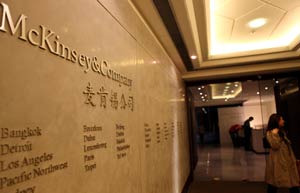Chinese consumers can be a big growth driver in Asian markets
By Alfred Romann and Kristine Yang (China Daily) Updated: 2014-09-29 06:57Vietnam is the darling of frontier markets. It is big enough to attract investors and has enough infrastructure in place to drive an already impressive market performance - although hurdles remain.
Current efforts toward integrated stock exchanges in the Southeast Asian region, alongside similar programs in other parts of Asia, are expected to further boost Vietnam's liquidity.
In August, Vietnam's stock markets outperformed those of other members of the Association of Southeast Asian Nations after three straight months of growth. By Sept 12, the Ho Chi Minh Index was trading at 632, up more than 115 points in four months.
The booming economy of this Southeast Asian country of 90 million people is easily seen in its GDP. In the second quarter of this year, its GDP rose 5.25 percent, according to data released in June by the General Statistics Office in Hanoi. In the first three months of the year, GDP climbed 5.09 percent.
The national currency, the dong, has dropped in value as part of an effort to spur exports. Bank lending has been rising. Direct foreign investment in the first half of the year was around $5.75 billion, up almost 1 percent from a year earlier.
Analysts believe the best way for investors outside Vietnam to tap into this growth would be through the stock markets in Ho Chi Minh City and Hanoi.
"We believe that there will be tremendous growth in the future from IPOs (initial public offerings) or recapitalization," says Thomas Hugger, CEO of the Asia Frontier Fund, a relatively new fund that invests directly in Vietnam.
Nguyen Chi Dung, Vietnam's deputy minister of planning and investment said: "Vietnam has a target to become an industrialized country by 2020 with GDP per capita of about $3,000. Investment is key to improving the economy and development."
At the moment, a series of barriers and an inordinate amount of red tape make it very difficult even for institutional investors to tap into the stock markets in Ho Chi Minh City and Hanoi. Also, the existing 49 percent maximum foreign ownership rule for listed companies prevents investors from plunking more money into Vietnam's stock markets. Some companies are already at the limit.
But institutional reforms are already underway.
Speaking at a conference in Ho Chi Minh City in June, Nguyen said that the country was embarking on a path of institutional and infrastructure reforms. Infrastructure reforms (such as better ports and airports) are relatively easy to undertake. The institutional reforms may take longer.
Last month, for example, Vietnam issued its first domestic exchange-traded fund and raised about 200 billion dong ($9.4 million) as a result. That is about twice what it was aiming for.
 |
 |
| Top 10 most attractive FDI destinations in the world | Top 10 investors to the Chinese mainland |
- China remains major market for Vietnamese farm products
- Vietnam to see 17.3% growth in imports from China in 8 months
- Vietnam, China border trade revenue hits $2.61b in H1
- China-Vietnam border trade cools amid bilateral tension
- China remains Vietnam's biggest trade partner in 2013
- More Chinese investment boosts China-Vietnam trade ties
- Alibaba pays $459m for stake in Chinese hotel tech company
- Golden Week to see record train travelers
- Dutch dairy giant eyes further success in China
- China approves 2 more private banks
- Chinese regulator urges tougher bank risk control
- Chinese economy takes 12.3% of world total in 2013
- Replicability key to Shanghai FTZ success
- Aggrieved companies 'should go to court'

















